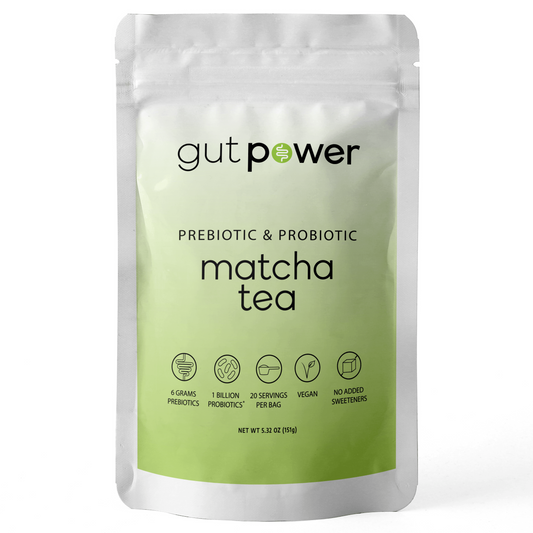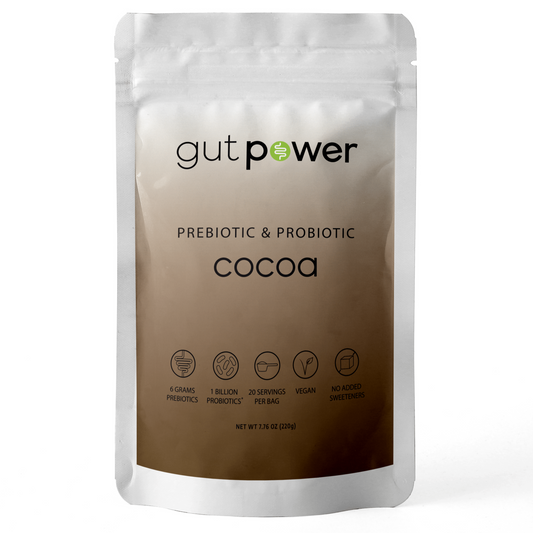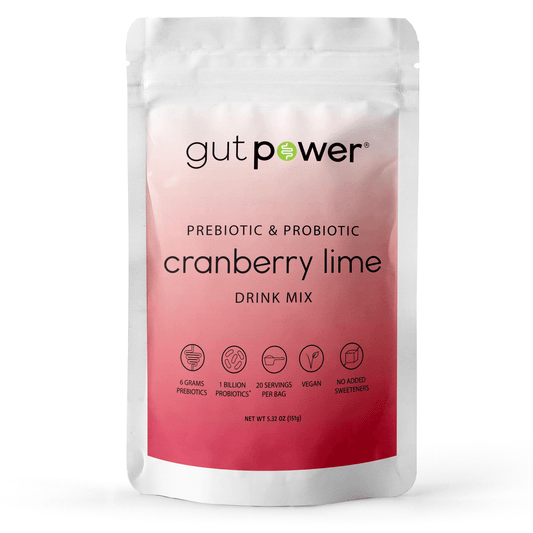Gut health and acne...is there a connection? In this article, we’ll dive into the gut-skin axis and how you can optimize your gut health for better skin.
The Gut Microbiome
Your gut microbiome is the collection of bacteria, viruses, and yeasts living in your intestines.
This collection of microorganisms help with proper digestion, creation and absorption of vitamins, regulating weight and immunity, and more.
The gut microbiome should have mostly beneficial bacteria and little “bad” bacteria or pathogens. When this balance between “good” and “bad” bacteria is off, you develop what is called “dysbiosis.”
Researchers believe that dysbiosis -- an imbalanced gut microbiome -- may play a role in acne. We’ll talk more about this in a bit!
The Skin Microbiome
The skin is your body’s largest organ and its first line of defense against the outside world. Part of that defense is your skin’s microbiome -- that’s right, just like your gut, your skin also hosts a collection of microorganisms!
The microorganisms on your skin help to protect you by strengthening your skin’s barrier and interacting with immune cells in your skin.
One of the organisms that lives on your skin, is called Corynebacterium acnes (previously known as Propionibacterium acnes, or P. acnes). This has long been an organism that researchers believed was correlated with acne development.
C. acnes is found on the skin of people with and without acne, though, so researchers believe that it may come down to the particular strain of C. acnes to determine whether it may or may not cause acne. That means if certain strains of C. acnes overgrow on your skin, they may cause acne, while healthy strains of C. acnes will not.
This is because when problematic strains of C. acnes colonize the skin and interact with your immune system, they produce a lot of inflammation, which causes the acne you see on your face.
The Gut-Skin Connection
So we now know that there are collections of microorganisms that live in both your gut and your skin...but how do they connect? And does improving the gut microbiome improve acne?
Yes! But let’s talk about why.
Remember “dysbiosis” -- that imbalance between good and bad bacteria in the gut microbiome? Well, researchers believe that improving this balance of bacteria in the gut may be a key to influencing acne.
And it all comes back to something called “leaky gut.” Ever heard of that?
Leaky gut (also known as “intestinal permeability” or “intestinal hyperpermeability”) is when the cells that line your intestines spread apart, allowing larger molecules to flow from the gut into your bloodstream.
If that doesn’t sound like a good thing, that’s because it’s not! Just like your skin provides a barrier from the outside world, so does your intestinal lining. So we want that barrier to be sealed up tight, only allowing beneficial things like nutrients to flow through.
Leaky gut can develop when you have an imbalanced (dysbiotic) gut microbiome, which is why a healthy microbiome is vital for healthy skin.
You see, when you have leaky gut, inflammatory compounds produced by bad gut bacteria (like lipopolysaccharides, or LPS) flow through from the gut microbiome to the bloodstream. This incites an immune response, and one that ultimately results in systemic inflammation, including inflammation in your skin.
Researchers believe that it is this negative interaction with the immune system that makes dysbiosis and the resulting leaky gut such a problem when it comes to acne.
In addition to this, leaky gut can also directly deposit gut bacteria that leaks through the gut barrier onto the skin itself, disturbing the natural skin equilibrium. This, too, may result in a skin microbiome that is more prone to developing acne.
Acne Diet: Is There a Best Diet for Acne?
If you’re wondering if all this affects what you should eat to control acne, the answer is also yes!
That’s because the way you eat has an effect on your gut microbiome. The healthy bacteria in your microbiome thrive off of the fiber, polyphenols (a type of antioxidant), and prebiotics found in your food.
But the best diet for acne doesn’t have to be complicated...In fact, it’s quite simple!
Research shows that the best diet for the gut microbiome (and thus, for acne) is one that incorporates plenty of fruits and vegetables and minimizes processed foods, industrialized seed oils (like canola or vegetable oil), and refined sugar.
That’s really all you need to worry about -- told you it was simple!
So fill up on your fruits and veggies (especially colorful ones!) and cut down on processed foods and you’re on the road to better gut and skin health.
Prebiotics and Probiotics for Acne
If you have dysbiosis -- an imbalanced gut microbiome -- prebiotics and probiotics may help you fix that. Remember that an imbalanced microbiome may play a significant role in acne, so balancing your gut bacteria is a great step toward improving your skin.
Probiotics are healthy gut bacteria. Probiotics can be found in foods like yogurt as well as in supplements. When you consume them, probiotics help to rebalance your gut microbiome by replenishing your supply of good bacteria and (bonus!) by pushing out the bad bacteria already living there.
Prebiotics are essentially food for your good bacteria -- they’re what your good bacteria like to “eat”. When you consume lots of prebiotics, this helps to increase counts of good bacteria in the gut microbiome and push out bad bacteria.
When you’re trying to improve the balance of your gut microbiome -- and your acne -- incorporating both prebiotics and probiotics becomes very important.
Think of an imbalanced microbiome as a war between good and bad bacteria within your gut and skin. In order to win the battle, your good bacteria has to overthrow the bad bacteria and fix the problems it created while it was in power (inflammation and leaky gut, which contribute to acne).
Sending in more good soldiers (probiotics) as well as supplies for those soldiers (prebiotics) ensures you’ve got a powerful army to win the battle.
The Bottom Line: Gut Health and Acne
Having an imbalance between good and bad bacteria in your gut microbiome is called “dysbiosis”.
Gut dysbiosis can lead to “leaky gut,” which allows inflammatory compounds from within your gut, and even bacteria itself, to travel through to the bloodstream.
Leaky gut incites an immune reaction -- one that researchers believe contributes to acne -- as well as allows bacteria from the gut to travel directly to the skin, disrupting the natural skin equilibrium and contributing to acne.
Eating a diet that feeds a healthy microbiome, plus consistently taking prebiotics and probiotics can help to rebalance an imbalanced gut microbiome. This can tighten up a “leaky” gut and promote healthy skin and may reduce acne.
Resources
Demirbaş, Abdullah, and Ömer Faruk Elmas. “The Relationship between Acne Vulgaris and Irritable Bowel Syndrome: A Preliminary Study.” Wiley Online Library, John Wiley & Sons, Ltd, 28 May 2020, Link
Lee, Young Bok, et al. “Potential Role of the Microbiome in Acne: A Comprehensive Review.” Journal of Clinical Medicine, MDPI, 7 July 2019, Link
Zhang H;Liao W;Chao W;Chen Q;Zeng H;Wu C;Wu S;Ho HI; “Risk Factors for Sebaceous Gland Diseases and Their Relationship to Gastrointestinal Dysfunction in Han Adolescents.” The Journal of Dermatology, U.S. National Library of Medicine, 2008, Link
Volkova et. al, Volkova LA;Khalif IL;Kabanova. “[Impact of the Impaired Intestinal Microflora on the Course of Acne Vulgaris].” Klinicheskaia Meditsina, U.S. National Library of Medicine, 2001, Link
Polkowska‐Pruszyńska, B., A. Gerkowicz, and D. Krasowska. "The gut microbiome alterations in allergic and inflammatory skin diseases–an update." Journal of the European Academy of Dermatology and Venereology 34.3 (2020): 455-464. Link





